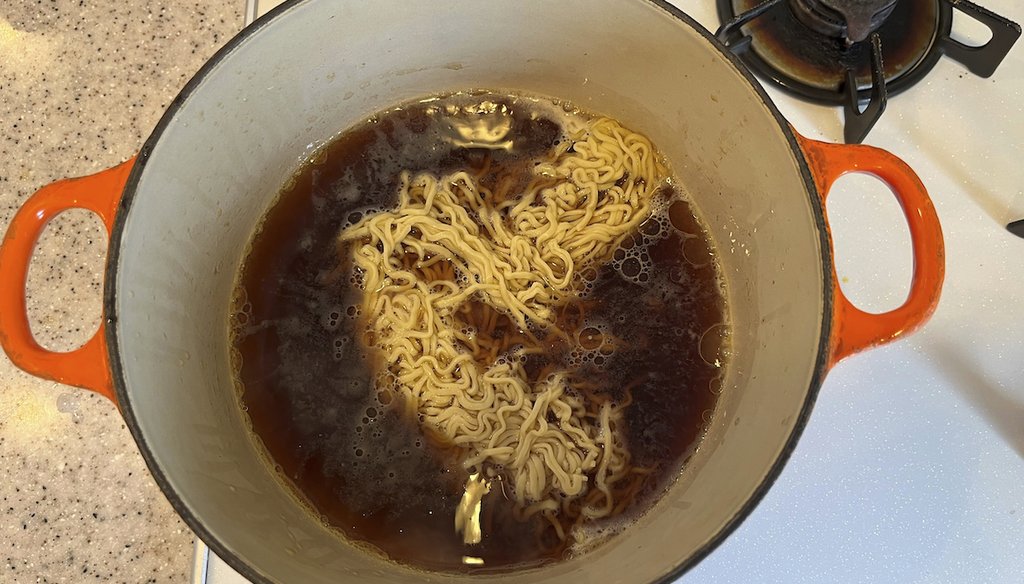

Our only agenda is to publish the truth so you can be an informed participant in democracy.
We need your help.


This file photo shows Ramen noodles added to a pot of soup. (AP)
The U.S. Centers for Disease Control and Prevention is not investigating any food-borne illnesses involving ramen noodles and has not issued any warnings about the products.
The U.S. Food and Drug Administration has not announced any recalls about ramen noodles because of deadly bacteria.
Ramen noodle lovers everywhere can slurp in peace. A social media claim that a deadly bacteria was found in the products is bogus.
The claim appears to have been instantly generated using artificial intelligence.
"A deadly outbreak linked to ramen noodles has sparked global fear as multiple deaths have been reported," a Sept. 17 Instagram video said through a talking fish.
The video also said children have gotten sick and died within hours and that the U.S. Centers for Disease Control and Prevention warned that a third of infected adults may die. Experts traced it to "a dangerous bacteria named streptococcal," the video said.
The Instagram post was later deleted but the video exists on YouTube under an account with the same name.
This post was flagged as part of Meta’s efforts to combat false news and misinformation on its News Feed. (Read more about our partnership with Meta, which owns Facebook, Instagram and Threads.)
The Instagram account’s profile page links to a product called Headlines, which, for a fee, says subscribers can "experience the future of news with AI-driven personalized content texted directly to you." It promises to send "fact-checked news texts based on your preferences."
It appears the fact-check of this Instagram post failed, however.
(Instagram screenshot)
The video shows screenshots of three online articles that describe seven children from other countries dying after eating instant noodles. Two of the incidents happened in South Africa in 2021, and the third in Pakistan happened in May.
We found other social media users making similar claims, citing the overseas deaths.
None of the articles mentioned streptococcal bacteria. A 2022 news report said Grandisync, the noodle manufacturer, said the children in South Africa died from ingesting an insecticide, not the noodles. We contacted the National Consumer Commission in South Africa, which was investigating the company, but received no response.
It’s unclear from other Pakistan news reports what caused the children’s deaths.
Back in the U.S., the CDC website shows no press releases or active investigations about foodborne outbreaks in ramen noodles, or about streptococcal being found in them.
Streptococcus is a contagious bacteria that can cause different types of infections, from minor ones such as strep throat to potentially deadly ones such as necrotizing fasciitis, a flesh-eating disease. Streptococcus is usually spread by respiratory droplets or direct contact, but rarely can be spread through improperly handled food, the CDC said.
The U.S. Food and Drug Administration, meanwhile, in May announced the company Sun Noodle voluntarily recalled about 37,000 cases of a frozen noodle product it said contained undeclared egg white powder. In December, New India Bazar recalled Maggi 2 Minute Noodles because of undeclared peanuts.
In 2019, a brand of veggie ramen was recalled because of hard-boiled eggs potentially contaminated with listeria.
But there are no recent ramen noodle recalls. We searched the FDA’s recalls, market withdrawals and safety alerts website and found nothing about ramen noodle products being recalled because of a deadly bacteria.
The claim that the CDC warned that people are at risk of death from a deadly bacteria found in ramen noodles is not backed by evidence. We rate it False.
CORRECTION, Sept. 23: This story was updated Sept. 23 to change the number of children who died after eating Ramen noodles in South Africa and Pakistan to seven.
Instagram post, Sept. 17, 2024
YouTube video, Sept. 17, 2024
U.S. Food and Drug Administration Sun Noodle Issues Allergy Alert on Undeclared Egg in S&S Frozen Cup Saimin, May 17, 2024
U.S. Food and Drug Administration, Allergy Alert for Undeclared Peanut in Maggi 2 Minute Noodles, Dec. 4, 2023
U.S. Food and Drug Administration, Recalls, Market Withdrawals, & Safety Alerts, accessed Sept. 17, 2024
Centers for Disease Control and Prevention, Active Investigations of Multistate Foodborne Outbreaks, accessed Sept. 17, 2024
Centers for Disease Control and Prevention, CDC Newsroom Releases, accessed Sept. 17, 2024
Centers for Disease Control and Prevention, About Group A Strep Infection, accessed Sept. 17, 2024
Cleveland Clinic, Group A Streptococcal Infections, accessed Sept. 17, 2024
Headlines, Experience the future of news with AI-driven personalized content texted directly to you., accessed Sept. 17, 2024
Food Safety News, Noodle link investigated as children die in South Africa, Dec. 11, 2021
The U.S. Sun, DEADLY DISH My two nephews and three other kids died after eating instant NOODLES – don’t feed them to your children, Nov. 22, 2021
Sowetan Live, Children died from insecticide poisoning, Jan. 6, 2022
Ary News, Sub-standard noodles blamed for two deaths in Lahore., May 30, 2024
Daily Pakistan, Two young siblings die after eating poisonous noodles in Lahore s Manawan, May 30, 2024
CBS News, Veggie ramen sold nationwide recalled over listeria concerns, Dec. 30, 2019
National Consumer Commission, press release, Dec. 9, 2021
In a world of wild talk and fake news, help us stand up for the facts.
